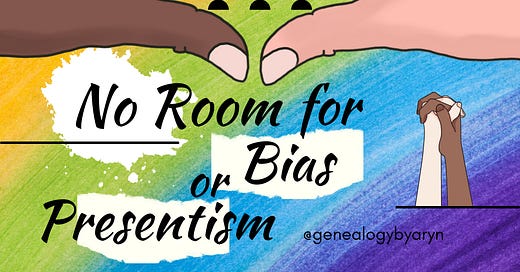Presentism and Bias in Genealogical Research
How Cultural Bias distorts the Truth of our Ancestors.
Imagine a time traveler visiting the present. They would see the world through a lens of their own time, potentially misinterpreting customs, technologies, and social norms. This limited understanding is a perfect metaphor for presentism, where the present perspective dominates our understanding of the past and future. Then there is bias. Bias is like a wedding veil draped over your face and limiting your vision. In the same way a veil will distort your perception of the world around you—bias makes it difficult to see and understand situations and information being presented to you.
While it is easy to adopt a presentism perspective or to lean into our own biases, as Family Historians, we must strive to stick to the facts, see the world as it was when our ancestors lived, and observe the lives of our past relatives as they lived and breathed them—not as our modern society dictates now or as our experiences tell us it “should have been.”
What is Presentism, and why is it bad for genealogical and family history research?
First, presentism is defined by Merriam-Webster dictionary as, “an attitude toward the past dominated by present-day attitudes and experiences.” It is when we apply our modern life experience, modern ideas, notions, laws, and thoughts and apply them to the time period of our ancestors.
A good example of presentism is the Netflix show Bridgerton. Now, don’t get me wrong—this isn’t an attack on Bridgerton or the multi-ethnic actors in the cast—it is simply a straightforward example of modernizing a very white time period.
There are many other television shows, films, and novels that also take a page from the presentism handbook - from films like Braveheart and Shakespeare in Love, television shows like Vikings and Reign, to novels like Sir Walter Scott’s Ivanhoe and Philippa Gregory’s, The Other Boleyn Girl. Each one of these takes liberties regarding the historical accuracy of their narratives. Yet, where we can forgive those inaccuracies because what they all have in common is that they are fiction.
As Family Historians and Genealogists, we have a duty to embrace the historic accuracy of our ancestors timeline. Unlike the authors of television, film, and books, we are not writing a work of fiction - we are documenting facts.
Second, bias is defined by Merriam-Webster as a : an inclination of temperament or outlook; especially : a personal and sometimes unreasoned judgment : PREJUDICE.
Bias can look like the idea that only women should cook or only men should be doctors. Bias leans into stereotypes and the limited ideas and notions we project into and onto the world. Ageism, gender bias, and the halo effect are only a few that can distort our perception of our ancestor's lives.
The use of presentism and bias while writing the narrative of our family’s story will only lead to distortion of the truth. In terms of family history, it doesn’t matter if you “like” or “dislike” something or someone from your family’s pedigree. What matters is proper documentation, citations, and facts.
As Family Historians, we can only research the facts and sources available to us to build the most accurate and well-documented family tree.
Doing anything but that distorts the lives of our ancestors and relatives, leaving future generations with only a fragment of who came before us. To learn more about Bias and Presentism - head over to BCG.







I think this is one of the most important thing we need to be cognizant of as family historians and genealogists. Thanks for addressing it. Something I do that helps me is adding historical context to my frame of reference, for example, reading newspapers of the day, first-person sources and historically accurate nonfiction, and then looking at the records through that lens.
Agree 100%. I have found myself guilty of this at times only to uncover more data that contravenes my own "jump to conclusion too early" narrative. This is exactly the reason why details matter. A very common occurrence is assuming a word back then means the same thing that it does today. Want to start a fight? Just ask several people what "A well regulated militia" means in the context of the Constitution.